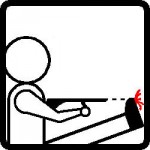 There’s nothing like a good reality TV train wreck. We all know that we are not supposed to look. It’s not politically correct to indulge in the shortcomings or misfortune of others. But we just can’t help ourselves, can we? The show is SO bad, it’s almost addictive.
There’s nothing like a good reality TV train wreck. We all know that we are not supposed to look. It’s not politically correct to indulge in the shortcomings or misfortune of others. But we just can’t help ourselves, can we? The show is SO bad, it’s almost addictive.
The Celebrity Apprentice is a reality-show-train-wreck like no other. Where else can you find a group of 12 wanna-be-celebrities who don’t have an ounce of talent, business acumen, common sense or humility between them? I mean seriously, where did Channel 9 get these people? They are touted as 12 of Australia’s most well know personalities. If that is true, God help us all.
The premise is admirable – the celebrities have been asked to bring their time, creativity and rolodexes to raise money for their favorite charity. Someone must have forgot to brief Deni Hines on these basic requirements because she refused to sing in one of the challenges (which is something she is supposedly famous for) because “she needed to protect her brand as a singer, animal activist and vegetarian.” Is she serious? Deni may want to re-think that strategy because she did more damage to her own brand in 2 weeks on the show than Allan Joyce did by grounding the entire Qantas fleet.
The only redeeming feature on the show is the ever charming, Mark Bouris. He comes across as engaging, fair and straight down the line. However, the show seems more like a glorified 60 minute advertisement for his company, Yellow Brick Road, than a charity fundraiser or bona fide reality series.
Channel 9, surely you jest?
Either your producers have completely run out of clever and entertaining ideas or you’ve grossly underestimated the IQ of the average Australian. We all expect reality TV to be staged, sensational and surreal. The Block, Australian Idol and Masterchef fit this bill perfectly. However, Celebrity Apprentice is just plain stupid. The formula is uninspired, the talent is questionable and the show simply has no point.
Seriously mate, were not in Kansas anymore! These 12 contestants have as much chance capturing the hearts and attention of the Australian public as you and I have of meeting the Wizard of Oz on the Yellow Brick Road.
09 Nov 2011
8 Ways You Sabotage Your Own Success in Business
As a business owner, I’ll bet you’re incredibly busy and find that there never seems to be enough hours in the day to complete all your work.
Have you ever noticed that some of your everyday activities are just deeply ingrained habits – driving your car, putting on your watch, brushing your teeth or taking a shower? You wouldn’t dream of not doing them, they are part of your routine and they just seem to happen automatically. In your business you also have habits such as checking your website, opening the mail, reading emails, grabbing a coffee and glancing at your diary. You do them without conscious “thought” and they seem to fill up hours in your day…
But what about all the actions you need to take in order to build a more profitable and efficient business? Like following up with your best customers, asking for referrals, strategic planning and goal setting to grow your business? When do you do these activities? Do they often get relegated to “tomorrow” or “sometime soon”?
If you’ve ever spent your day stuck in back to back meetings, answering routine questions from your team, responding to emails, helping other people, doing paperwork or tidying your office – you already know that these are “make busy” activities, and they will keep you trapped where you already are – just simply maintaining, not growing your business. By filling your days with these tasks, you are in effect avoiding the very activities that you know will really move your business forward and produce tangible results.
Your “make busy” work or habits create the magnificent illusion that you are hard at work, simply because you feel “flat out” and your day is full of tasks. Let’s be honest, you would actually rather do anything than face the activities you know would radically accelerate your business success NOW! In fact, you often get to the end of the day and say to yourself “It’s OK, I was really busy, I’ll just get to that marketing plan tomorrow.” Or “I just couldn’t find the time today to make that seminar on leadership or customer loyalty.”
If you are waiting for the right or best time to do these critical activities in your business, it will simply never come! There will always be other “busy work” to fill all of your available time. You need to find a way to make your business building activities an ingrained habit too, if you want to grow your bottom line and live the lifestyle of your dreams.
Do you relate to or identify with any of these common sabotage habits?
1. Perfectionism – this tactic is insidious. It often immobilizes us from making a decision, starting a project or activity and signing off on a piece of important work. Most tasks don’t have to be 100% perfect, they just need to be good enough. The other way that this can show up is when you deceive yourself into believing that no-one else can do the job (even simple routine tasks) to your exacting standard, so you must do it ALL yourself. Follow the 80/20 rule, delegate what you do not have to do yourself and give yourself permission to be human!
2. Refusing to Let Go of The Past – Have you ever heard yourself say “last time I tried that, it didn’t work”? Or have you ever simply avoided doing something that you know you should or need to do but were afraid to do because “last time it didn’t work out the way you wanted it to”? Even though it’s a good idea to stop doing what clearly doesn’t work, it’s important to remember that the past does not necessarily equal the future. If you catch yourself finding reasons from the past to justify why you are not moving ahead toward your compelling future, stop NOW and take a good hard look at whether these are just cleverly disguised forms of self-sabotage.
3. Lack of Accountability – who is holding you accountable to the decisions you make and the actions you take in your own company? Isn’t that why you went into business for yourself in the first place – so that you could be the boss and do things your way? Find someone outside your business – a coach, mentor or trusted advisor that can act as a sounding board and hold you accountable to staying on track.
4. Lack of vision, planning and specificity – if you don’t know where you are going, how will you know when you get there? Enough said. If you don’t have a 90 day, 1 year and 3 year business plan, you need to make this your number one priority in your business. Set a weekend aside and find a place where you will not be disturbed by anyone or anything. Set down your goals clearly and succinctly – get clear about the specifics (who, what, where, when and why) and set realistic deadlines for completion. Goals need to be written down in detail to allow your mind – which is a goal seeking mechanism – to do its magic.
5. Lack of focus – stay focused on the important task you are currently working on and only allow yourself to be diverted by real emergencies.
6. Fear of Financials – you cannot have a truly successful business if you don’t know your numbers. Not knowing your numbers has already cost you time and money. Find someone who can explain your financials to you in plain English – learn the key drivers and indexes in your business (such as break even, productivity ratios, inventory turns, gross profit margins etc.) and track them daily.
7. No USP – the greatest product or service in the world will not sell if you have not clearly defined why someone should buy from you instead of your competitors. “Build it and they will come is a fallacy.” If you have not yet figured out what is unique about your product or service and found a compelling and cost effective way to communicate it in everything you do, you are literally flushing your marketing budget down the toilette.
8. No Testing and Measuring – this is the most-often overlooked activity by small business owners. The simple act of testing and measuring everything in your business…and I mean everything…will save you thousands of dollars this year. No matter what “it” is, if you haven’t tested and measured “it”, you don’t really know if “it” works. And until you know if it works, you don’t have a reliable, predictable business that will run without out.
Unfortunately, there are no quick fixes. As you already know or suspect, some of the most common forms of self-sabotage are habits because they are deeply ingrained behaviours that take time to establish or eliminate. In the 1960’s a highly regarded plastic surgeon, Dr. Maxwell Maltz discovered that it took 21 days for amputees to cease feeling phantom sensations in their amputated limb. From further observations and significant research he established that it takes 21 days to create a new habit.
Brain circuits take engrams (which are essentially “memory traces”) and produce neuroconnections and neuropathways only if they are bombarded for 21 days in a row. This means that our brain does not accept new data or information for a change of habit unless it is repeated each day (without fail) for at least 21 days. Changing habits (whether positive or negative) can be done but it takes time and consistent effort.
Do yourself a favour and identify today which form of self-sabotage is the primary one that is holding you back from having the business and lifestyle of your dreams. Make a plan on paper – specific decisions and actions that you can take to move forward in this aspect every single day for the next month. It is imperative to track your progress each day and I highly recommend finding an objective person outside of your business to hold you accountable to your plan, actions and results.
17 Oct 2011
What’s The Best Way to Break a Bad Habit?
Without a doubt, the number #1 question I get asked by clients is ‘how do I break a bad habit like procrastination, worry, insomnia, negative thinking or smoking’? There are a million examples of ways that each one of us holds our own success back by ‘doing’ unproductive habits. To make lasting change to deeply ingrained bad habits using willpower and positive affirmations alone is not realistic.
Everyone knows that positive thinking is undependable and produces inconsistent results, at best. The self-image on the other hand underpins our level of emotional intelligence (EQ), which is now recognised as being an even more important measurement for success than the IQ. It has been scientifically proven that our brain circuits take engrams or memory traces, and produce neuro connections only if they are bombarded with the information for 21 days in a row. This means that our brain does not accept ‘new’ data (ie break a bad habit) unless they are repeated each day for at least 21 days, without missing a day.
If you want to break bad a habit like refusing to let go of the past, spending all your time worrying about what might go wrong, overeating, biting your nails or spending more than you earn, it can be done but it will require consistent effort on your part, every day for at least 21 days. In order to do it, your success rate will improve significantly if you can replace that old habit you no longer need with a good and productive habit that will support you to achieve your goals and find someone to help keep you accountable.
And remember, no matter where you are in your life right now — the choices you have made or the experiences you have had — you can break a bad habit because it is never too late to become the person you were meant to be!
28 Sep 2011
What If You’ve Already Got The Life You Deserve?
 I have been fortunate to discover that there is a reason for all things – even those that are senseless and incomprehensible – and that we have to learn to trust that there is a bigger picture that perhaps we, as mere human beings, can never truly understand.
I have been fortunate to discover that there is a reason for all things – even those that are senseless and incomprehensible – and that we have to learn to trust that there is a bigger picture that perhaps we, as mere human beings, can never truly understand.
What if you’ve already go the life you deserve?
The most beautiful expression of this idea I’ve ever read was in a children’s book ‘Little Soul in the Sun’ by Neil Donald Walsh. In the story, Walsh talks of a Little Soul who wants to be incarnated as a human being to learn ‘forgiveness’. A Friendly Soul agrees to oblige him by incarnating as a person to do something to the Little Soul that will help him learn the lesson of forgiveness. But the Friendly Soul issues a plea of caution and says, ‘at the very moment that I strike you down, please promise me that you will remember who I really am, a Friendly and loving Soul, otherwise we will be doomed to repeat the process over and over again until we get the learnings or until another Little Soul comes down to help us find the way out.’
In other words everything that happens in our life – the good the bad and the just plain ugly is the result of an agreement that we have made at some point in our existence to experience certain things so we can become better human beings and move on to the next lesson. We are all doing the best that we can with the resources that we think we have available. Everything is a learning experience and if viewed from that context, we can become empowered to create a world around us in the likeness of our dreams and wildest imaginations.
Even the really hard stuff happens for a reason. There is no failure, only results.
It isn’t about assigning blame or beating yourself up – it’s about being responsible for your response and deciding how best to move forward and attract the results that you want.
Blaming others – even if it’s legitimate – robs you of your power. It doesn’t help you move on – it’s a complete waste of your time and emotion. Put it in the past and find a way to ensure you never repeat it.
Things don’t change – WE change.
The only way to be the change that you want to see in the world is to take responsibility for the life that you say you want to be living. Regardless of the events and circumstances that have occurred, no answers may be found revelling in excuses.
You are already living the life you deserve and imagine in your mind every day. If you are not happy and you want more, you need to step up and BE more. Otherwise, you are destined to repeat the same experiences over and over until you learn the lesson. Even though it may be a hard pill to swallow, on some level you agreed to experience everything that has happened to you – you did this with the understanding that it would help you to grow and to evolve as a human being.
In fact, you already have the life you deserve (and wanted). It begs the question though – “when are you going to forgive yourself (and others), get the “learnings” and move on to the next important lesson that you have chosen for your evolution?”
It has been over 50,000 since human beings lived in caves. All those years ago, life was pretty much about survival – each morning our ancestors would emerge from their caves and scan the horizon for imminent danger. Although things have changed a lot in our external environment in the last few thousand years, in many ways, the wiring in our brains has not. In fact, 90% of what you and I do on a day to day basis is still based on that ancient wiring and survival mentality and it is precisely this legacy that needs to be re-directed to prevent self sabotage from holding you back, personally and professionally.
You see our brains are wired to spot and avoid danger. It is because of these primitive instincts that we all have a tendency toward self sabotage.
Even though the danger may not be “life or death”, we see this dynamic play out in our work environments almost every day. For every daring and outlandish new idea that is proposed by one hopeful soul, there will be a long list of skeptical colleagues who are willing to offer 20 reasons why the idea might fail or cause harm. This sabotages innovation and progress.
So, how does this play out exactly?
We seem to have a biological urge to save people from themselves – this may take the form of overtly belittling the person with the idea, tearing the proposal to shreds, refusing to examine or consider the suggestion seriously or creating an environment where it is unsafe to brainstorm or take risks. Instead of fostering initiative and exploring options, the focus is immediately shifted to put up protective roadblocks and creative stop signs (i.e. sabotage).
Does any of this sound familiar?
Either the voice in your own head that says “you cannot do it” or the guy who sits two cubicles away and has a knack for tearing everyone else’s ideas to shreds… yet he can never seem to come up with an innovative or original solution of his own. In our vigour to ensure that new ideas are properly vetted and scrutinized, our ancient and hard-wired brain response to scan for danger and protect ourselves, is effectively killing innovation. This automatic reaction needs to be identified and consciously overridden in order to ensure that we (as individuals and organizations) start generating novel and constructive solutions to problems.
3 Tips to Avoid Sabotage and Foster Innovation
1.Eliminate “But” – Instead of searching for looking for defects or pointing out why something won’t work, focus on how you can add to the discussion or process. When you (or someone else) conceives of a concept or strategy, resist the urge to say “yes, but that will never work because”. By substituting the word “and”, it will allow you to constructively add to or expand upon the idea rather that stopping the creative process dead in its tracks. This slight change in words and focus will exponentially impact creativity and reduce sabotage.
2.Don’t mix right and left – Creativity and innovation are often associated with predominately “right” brain thinking. While critiquing and evaluation are often considered the domain of the “left” brain. It is difficult (particularly in a group dynamic) to generate momentum around creativity and imagination while simultaneously attempting to evaluate and examine each idea. Even the most adept and flexible brain will struggle to shift gears back and forth. In order to create the best environment for each and get the best results, it is preferable to schedule a separate time for brainstorming and appraisal.
3.Put away your club, caveman – It takes approximately one second, from the time you physically react to something in your environment that generates a strong emotion, to when your conscious mind kicks in and you start to think things through. When generating new ideas and searching for innovative solutions, resist the urge to club suggestions to death. Take a deep breath and think things through before commenting verbally. Consider using a trained facilitator for group sessions – this will keep everyone accountable and provide an objective perspective if the atmosphere becomes in conducive to advancement.
I once heard a senior manager chastise someone in front of 14 colleagues for suggesting an idea that seemed [to him] preposterous and impractical. You could have heard a pin drop in that room and it pretty much shut down the communication for the rest of the meeting. Nothing got solved and everyone left deflated. In one foul blow that manager essentially killed any hope of brainstorming a viable solution. At the end of the day, every problem has a solution. The key is to harness and re-direct the infinite potential within your own mind (and the collective mind of the team) to find the inspiration that will produce the desired result.










